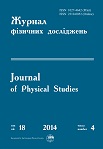DOI: https://doi.org/10.30970/jps.19.3603
MUTUAL DIFFUSION IN THE LIQUID SOLUTION OF ACETONE-CYCLOHEXANE WITH A COMPLEX FORMATION
A. M. Kutsyk, V. V. Obukhovsky
Taras Shevchenko National University of Kyiv
Faculty of Radiophysics, Electronics and Computer Systems
Hlushkova Ave., 4h, Kyiv, 03022, Ukraine
